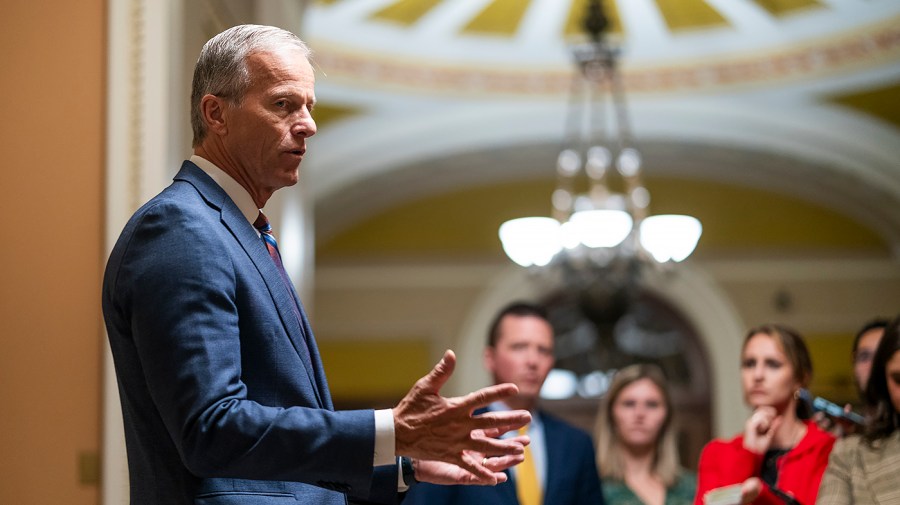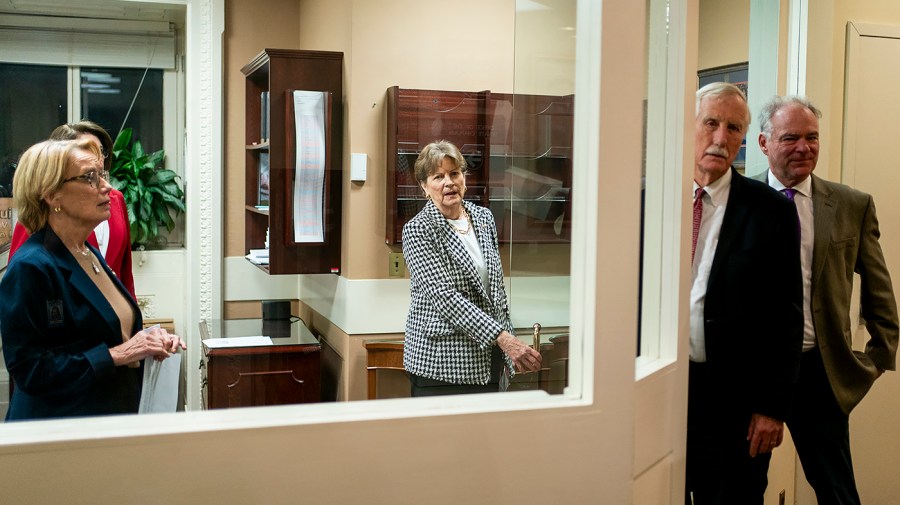The Senate voted Monday evening to end the 41-day government shutdown, setting the stage for the House to reconvene later this week to pick up the legislation and send it to President Trump’s desk.
The Senate voted 60-40 to pass a bill to fund military construction, veterans’ affairs, the Department of Agriculture and the legislative branch through Sept. 30, 2026, and the rest of government through Jan. 30.
Eight members of the Democratic caucus voted for the deal, breaking with Senate Democratic Leader Chuck Schumer (D-N.Y.) and causing a huge rift within the party.
The Democrats voting yes were Sens. Jeanne Shaheen (N.H.), Maggie Hassan (N.H.), John Fetterman (Pa.), Catherine Cortez Masto (Nev.), Jacky Rosen (Nev.), Tim Kaine (Va.) and Democratic Whip Dick Durbin (Ill.).
Sen. Angus King (Maine), an independent who caucuses with Democrats, also voted for the measure.
Democratic senators debated the bipartisan deal negotiated by centrist Democrats with Republican leaders and the White House for more than two hours Sunday afternoon.
Angry progressives in the House and who are running for Congress next year slammed the deal and some called for Schumer to step down as leader.
“Senator Schumer is no longer effective and should be replaced. If you can’t lead the fight to stop healthcare premiums from skyrocketing for Americans, what will you fight for?” Rep. Ro Khanna (D-Calif.), a leading House progressive, posted on X, the social media platform.
Sen. Bernie Sanders (I-Vt.), a leading progressive, called the decision by seven members of the Senate Democratic caucus to vote for the bill “a very, very bad vote.”
“What it does, first of all, is it raises health care premiums for over 20 million Americans,” he said.
Democratic centrists pushed back against the attacks.
Sen. Jeanne Shaheen (D-N.H.) who took the lead in negotiating the appropriations bills and continuing resolution in the package — along with Sen. Patty Murray (D-Wash.) and Rep. Rosa DeLauro (D-Conn.), the vice chair and ranking member of the Senate and House Appropriations Committees — defended Schumer from the attacks.
“All those people who oppose this agreement — staying in a shutdown mode was not getting us anywhere. They need to train their fire on the people who are responsible. That’s President Trump,” she told CNN in an interview.
But even Shaheen’s daughter, Stefany, a Democratic candidate for Congress in New Hampshire, said she “cannot support” the deal because it did not extend health insurance premium subsidies.
Senate passage of the bill sets the stage for the House to return to Washington on Wednesday to vote on the measure.
Speaker Mike Johnson (R-La.) said he would give House colleagues 36-hour notice to reconvene after the Senate approved the package.
House leaders on Monday night called members back and said the lower chamber would vote as early as 4 p.m. on Wednesday on the bill. They also asked members of the House Rules Committee to be ready to meet as soon as Tuesday evening to lay the groundwork for the bill.
The lower chamber hasn’t voted since Sept. 19.
President Trump said Monday he would “abide by the deal.”
“The deal is very good,” he said, and predicted, “we’re going to be opening up our country very quickly.”
The bill includes language to protect federal employees who were laid off by the Trump administration during the shutdown and prevent the White House from attempting future reductions in force (RIFs) until February of next year, at soonest.
But it does not include language to extend the enhanced health insurance premium subsidies under the Affordable Care Act (ACA), which are due to expire in January.
Democrats made extending those subsidies their top priority heading into the shutdown and came away empty-handed after President Trump refused to negotiate a deal to address rising health care costs.
King, who negotiated a deal with Senate Majority Leader John Thune (R-S.D.) to give Democrats a vote in December on a bill to extend the ACA subsidies, said it became increasingly clear as the shutdown dragged on that Republicans would not cave in the health care fight.
“Maybe in the first week we weren’t so sure they were for real. In the second week, third, fourth, fifth, sixth week, it became clear that the [Democratic] strategy wasn’t working. They weren’t going to come back and say we want to do something on the ACA,” King said.
Kaine, who negotiated with the White House to add language to the bill to retain federal employees laid off during the shutdown, agreed with the assessment that Democrats were not going to get anything more from Republicans on health care during the shutdown.
He said that Democrats who changed their positions to vote to reopen government had “voted repeatedly” over the past month “with the Democratic strategy of ‘We’re not opening and we want you to take action on the ACA tax credit.’”
“But after 40 days, it wasn’t going to work,” he said.
Democrats grew increasingly concerned about the impact on air traffic controllers who had to work for 40 days without paychecks, which led to work absences, staff shortages and growing traffic snarls at airports.
“When these controllers are keeping airplanes safe in the air, I don’t want them worried about the paychecks and problems that they have at home,” Durbin said, explaining his vote.
More than 2,200 flights across the country were canceled on Monday, according to FlightAware.
“I think the slowing of flights for whatever reason contributed substantially. We’re coming on the holidays. It’s something that people see, touch, feel and I think if you ask me to name one thing that caused our Democratic friends to agree … it’s those flights,” he said.
The bill now faces a partisan battle in the House, where Republicans will have an even narrower majority after Republicans seat Rep.-elect Adelita Grijalva (D), the winner of a special election in Arizona to fill the seat of her father, the late Rep. Raúl Grijalva (D-Ariz.).
House Democratic Leader Hakeem Jeffries (N.Y.) has vowed that House Democrats will oppose the bill, although a few centrist Democrats may defect from the leadership’s position.
Monday’s vote sets up a negotiation in the Senate on a bill expected to reach the floor next month to extend the ACA subsidies, though Republicans will insist on reforming the program.
Thune on Monday told reporters that he thinks a health care deal is possible.
“I think there’s a path forward on that. Obviously, it can’t be without reforms. My expectation is at some point the president is going to be very inclined to want to do something to make health care more affordable in this country,” he said.
Reaching a deal will be very difficult as many Republicans in both the Senate and House view the Affordable Care Act as an unworkable framework for health care in the future.
“I don’t think there’s any appetite among Republicans to just extend the status quo,” said Sen. John Kennedy (R-La.). “Extending the status quo is just putting fresh paint on rotten wood.”














